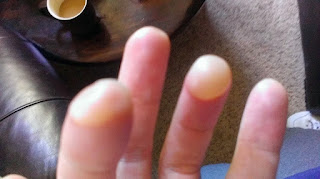Health precautions for instrumentalist to avoid injuries
Anyone who practices, rehearses or performs instrumental or vocal music has the potential to suffer injury related to that activity. Instrumental musicians are at risk for repetitive motion injuries. Sizable percentages of them develop physical problems related to playing their instruments; and if they are also computer users, their risks are compounded. Instrumental injuri
es often include carpal tunnel syndrome, tendinitis, and bursitis. Incorrect posture, non-ergonomic technique, excessive force, overuse, stress, and insufficient rest contribute to chronic injuries that can cause great pain, disability, and the end of careers. Follow these precations to avoid injuries:
1. Evaluate your technique. Reduce force, keep joints in the middle of their range of motion, use large muscle groups when possible, and avoid fixed, tense positions.
2. Always warm up. As an athlete would not begin a vigorous physical activity without warming up, a musician must warm up carefully before practice or performance.
3. Take breaks to stretch and relax. Take short breaks every few minutes and longer breaks each hour. Two or more shorter rehearsals each day are more productive than marathon single sessions. Even in performance, find those opportunities to relax a hand, arm, or embouchure to restore circulation.
4. Pace yourself. No pain, no gain is a potentially catastrophic philosophy for a musician. Know when enough is enough, and learn to say ‘no’ to certain performances or lengths of performing that might result in injury.
5. Check out your instrument. Does your instrument place undue stress on your body? Is your instrument set up optimally for you to relieve pressure on hands, joints, etc.? Is there a strap, carrier, or stand available to relieve the stress?
6. Evaluate other activities. Pains and injuries affecting your music making could be caused by other activities in your daily life. Computer use is notorious for causing afflictions including carpal tunnel syndrome and tendinitis.
7. Pay attention to your body. Pain is the mechanism by which your body tells you that something is wrong. Listen to your body; if it hurts, stop what you are doing.
8. Get medical attention. Do not delay in seeing a doctor. A physician may prescribe a minor adjustment or, in worst-case scenarios, stipulate not performing for a period of time. As drastic as this may sound, a few months of rest is better than suffering a permanent, career ending injury. Likewise, the demands placed on singers’ voices are immense. Hardly a month goes by where a top singer is not forced to interrupt a tour, take a break, or undergo a medical procedure due to problems with their voice. Medical professionals are making the case that the demands put on one’s voice when singing one to three hours is as intense as those made on an Olympic marathon runner’s body. Additional factors such as nutrition, smoking, drug use, noisy environments, and proper voice training (or the lack of it) all play a role in a singer’s ability to perform at her/his best.
This article originally appeared on Simpson.edu




